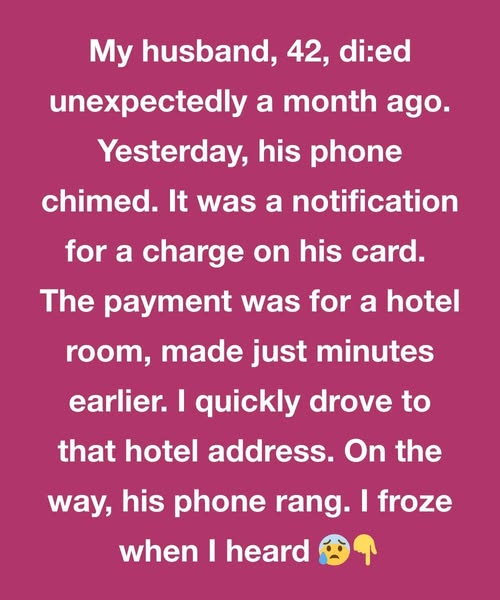My husband, 42, died unexpectedly a month ago.
Yesterday, his phone buzzed.
It was a notification—a charge on his credit card.
The payment? A hotel room, booked just minutes earlier.
Shocked, I grabbed his phone and drove straight to the hotel address.
On the way there, the phone rang.
I froze when I saw the caller ID: “Marlon – Work.”
Marlon was his boss—or at least, I’d always thought so.
I didn’t answer. My hands were trembling, my mind racing. How could a dead man’s credit card still be active? Who was using it to book hotel rooms?
I arrived and parked half a block away, my heart pounding. I didn’t know what I expected—fraud, maybe. Identity theft. Something rational.
I walked into the hotel lobby, trying to appear casual.
“Hi,” I said with a polite smile. “Can you tell me what room Alden Verner is in? He left something behind and asked me to bring it.”
The woman at the desk checked the system.
“Room 403,” she replied.
My breath caught in my chest.
I took the elevator, floor by floor, feeling like my legs were made of lead.
Room 403.
I knocked.
No answer.
I knocked again—harder.
Still nothing.
So I sat down on the floor, leaning against the wall, trying to keep my grief and confusion from swallowing me whole.
Then, the door behind me creaked open.
A teenage girl—no older than 17—peeked out.
“Are you… here for him too?” she whispered.
I blinked. “What?”
She glanced nervously over her shoulder, then stepped out into the hall. Her curly hair was tied in a messy bun, and she wore an oversized sweatshirt that clearly wasn’t hers.
“I saw him leave a few hours ago,” she said softly. “He didn’t look dead.”
My throat tightened.
“I don’t know who you think you saw,” I said, trying to steady my voice. “But my husband is dead.”
She studied me for a moment, then said, “You might want to come inside.”
The room was a mess—takeout containers, a duffel bag, and, on the nightstand, a photo of my husband.
“I didn’t touch anything,” she said quickly. “I clean rooms part-time. When I saw the photo, I recognized him. He was here last week too—with another woman.”
The room seemed to tilt beneath me.
“What did she look like?” I asked.
She hesitated. “Maybe late 30s, blonde, wore glasses. She seemed… nervous.”
I sat on the bed, staring at the carpet.
Then I opened his phone.
It had been mostly wiped clean—empty texts, no recent calls. But in the browser history, one search stood out:
“What happens if you fake your death and get caught?”
Suddenly, everything clicked.
Alden had a massive life insurance policy. Just last week, a payment had hit a joint account I didn’t recognize—but it had my name on it, so I assumed it was the bank sorting things out.
“Do you remember the name he used when he checked in?” I asked the girl.
She nodded. “Carter. Carter Verner.”
My stomach dropped.
Carter was Alden’s middle name.
It all made sense now.
He hadn’t died.
He had disappeared.
For the money. For a new life.
He had staged a heart attack—alone, at his cabin—and faked his death perfectly.
I’d buried an empty casket.
I didn’t cry. Not then.
I thanked the girl and walked straight into the hotel manager’s office.
“I need to report identity fraud,” I said calmly, showing Alden’s photo. “I believe someone is impersonating my deceased husband.”
The police were called within the hour.
Three days later, they found him at another hotel across state lines—with the woman—a former coworker I vaguely remembered from one of his company parties.
The insurance fraud was massive. He’d forged a death certificate and used a contact in records to pull it off. His plan? Lay low for six months, then disappear to Belize.
He hadn’t intended to leave a dime for me or our son.
He was arrested on charges of fraud, conspiracy, and filing a false death declaration.
In court, I stared him down as he tried to explain that “it wasn’t about leaving me—it was about starting fresh.”
I didn’t say a word.
Because there was nothing left to say.
But you know what?
I’m okay now.
I used to think the worst thing that could happen was losing him.
But I was wrong.
The worst thing was believing in something that was never real—believing in a man who had only ever played a role.
And somehow, seeing the truth clearly was… freeing.
I sold the house, moved closer to my sister, and started over with my son—who, by the way, is happier than I’ve seen him in years.
Sometimes, what feels like the universe punishing you… is actually just clearing space for something better.
And when the truth finally shows up—even if it breaks you—it also sets you free.
